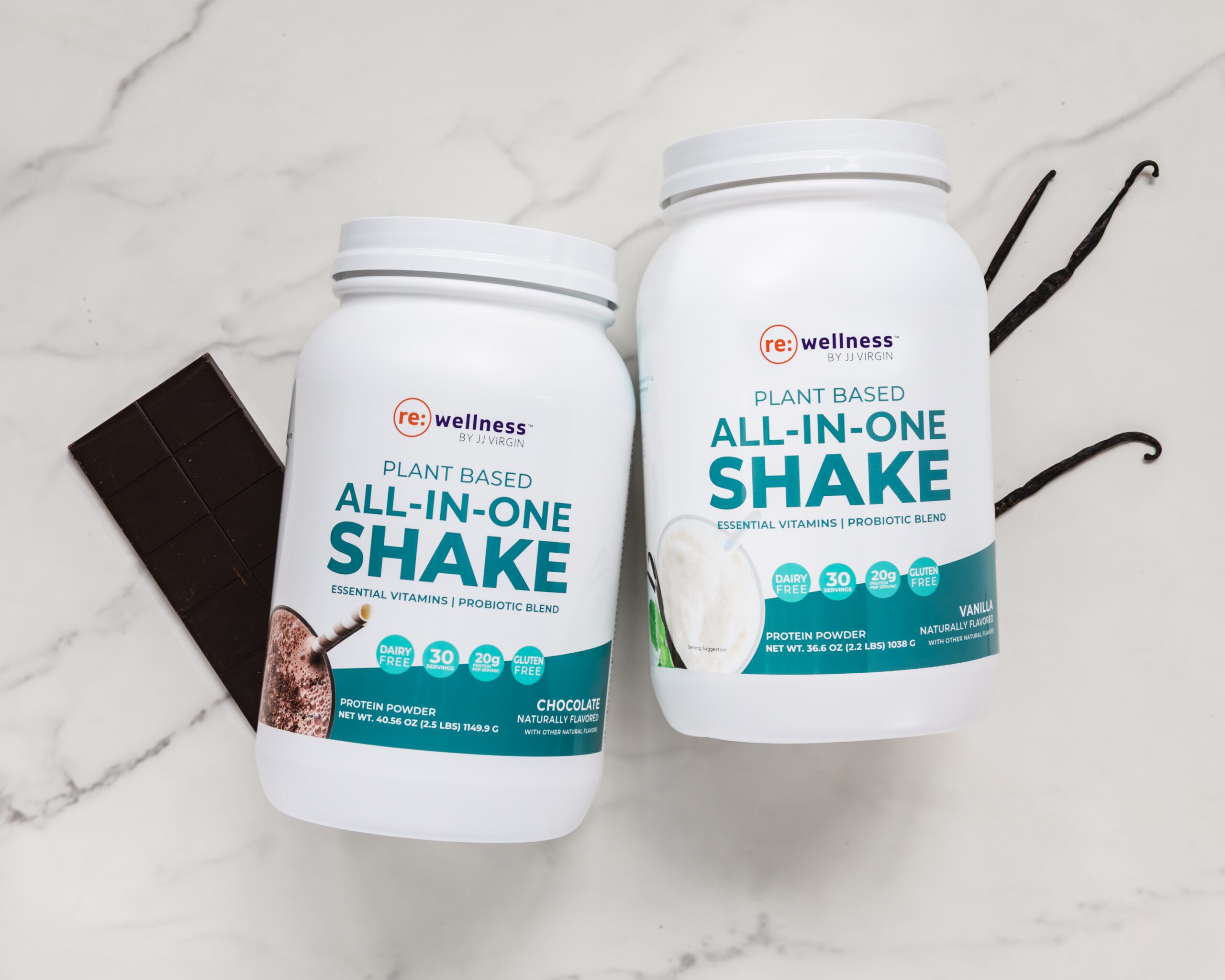If you think living a healthy lifestyle and eating a clean diet means you don’t need supplements, think again!
An alarming number of Americans are simply not getting enough of their nutrients through their diets or lifestyle. Even those who make smart choices about their health.1
To prove this point, I ran a micronutrient test on a group of my health guru buddies. All of them are known to have their nutrition and lifestyle habits dialed in—they’ve built their livelihoods on it!
When the tests came back, everyone had some gaps in their nutrient levels. It was clear that we can all benefit from smart supplementation.
How did this happen? There are tons of reasons, including our environment and the standard American diet—appropriately shortened to SAD. While many of these factors are beyond our control, they’re still things we must consider when we think about our diets and plan how to get the nutrients we need to thrive.
Why Supplements Are So Important
Let’s dive deeper into the top reasons why it’s more difficult than ever to get everything we need from our food, and why supplementing can help you make up for those lost nutrients.
1. The Standard American Diet Is Low on Nutrition
If you walk through your local grocery store, most of the foods you’ll find are in boxes, plastic wrap, or cans. Fast-food restaurants are doing brisk business, and in any vending machine you’ll find soda or energy drinks in colors that belong in a crayon box—not in your body.
And that’s the food that most people recognize as unhealthy. Don’t even get me started on the “health” foods that are supposedly good for you, but are filled with sneaky sugars and inflammatory ingredients. (Green juice brands, I’m looking straight at you!)
This is a far cry from what our meals looked like decades ago. One study that analyzed the American diet over the past two centuries found that the availability of processed and ultra-processed foods went from about 5% to nearly 60% overall, and jumped far higher for certain foods, like cooking oils, flour, poultry, and dairy.2
Take processed fats like margarine or vegetable oil. As whole fats like butter and lard decreased in availability, processed fats like margarine and cooking oil increased 192% and 329%, respectively.
We should have gone in the opposite direction. Over the past century, as we learned more about nutrition science and the foods that help our bodies run at peak performance, we should have been looking for ways to produce, market, and consume those whole-food ingredients.
Instead, we’ve prioritized foods that go through processing procedures to be made in mass quantities, shipped across the globe, accessible all year long, last on shelves, and fit easily into our on-the-go lifestyles. So rather than sticking to the whole food basics and finding new ways to enhance our diets, we’re “moving forward” with processed junk. Talk about a lack of progress!
2. Nutrient Depletion of Soil & Crops
Soil used to be more nutrient-rich.
This decrease in nutrients is called soil degradation, and it can slowly happen over time, thanks to natural occurrences like water and wind erosion. But humans have also greatly contributed to the rapid degradation of our crop soil.
We’ve traded high-volume production for our health, and our ingredients have chances to decrease in nutrients at every step of the supply chain.
Modern farming practices and manmade problems like overfarming, overgrazing, deforestation, and commercial pollution have accelerated soil degradation severely in the past generation alone. The UN has warned that 90% of the Earth’s topsoil is at risk by 2050 and has advised using practices like crop rotation to counteract that loss.3
Pesticides are also to blame. These chemicals are designed to protect our crops from pests. But plants already have a natural mechanism in place to do just that. They create healthy phytonutrients and polyphenols as a natural form of self-preservation—and humans get the healthy benefits of these when we eat those plants.
But when plants are drenched in pesticides, they don’t need their own method of self-preservation, and we miss out on the benefits of those missing nutrients. Pesticides also makes it more difficult for plants to evolve and promote the biodiversity that keeps our planet and other living organisms healthy, thus perpetuating the cycle of degradation.4
Additionally, Americans eat tons of genetically modified crops. Often, modified crops take on their new characteristics—like being more climate-resistant, for instance, or growing faster to meet demand—but scientists’ ability to manufacture their natural nutrients lags behind their ability to give them new features.
The research that backs this up is numbing. You’d need to eat eight of today’s oranges to get the same amount of vitamins of one orange in your grandparents’ generation.5
Unfortunately, this degradation is completely beyond our individual control. And since we can’t go back in time and enjoy a single early-century orange dripping with vitamin C, supplementing is a wise choice to take back some of those nutrients.
3. Toxins in Your Food & Environment
We live in a toxic era.
It’s bad enough that we have to be on the lookout for sneaky sugars, artificial sweeteners, and foodborne parasites and bacteria. But it doesn’t end there. There are microplastics in drinking water6 and gut-damaging herbicides in our foods.7
And depending on where you live, you may already be well aware of the negative effects of extreme pollution on our climate and its link to debilitating health conditions. One study found that more exposure to air pollutants had a harmful risk on breast-cancer survival, for instance,8 and another found that a decade’s worth of exposure to fine particulate matter led to a 16% higher rate of dementia.9
A steady supply of certain vitamins, nutrients, and minerals can help counteract this exposure. Omega-3s, for instance, have been found to protect against the brain shrinkage that exposure to pollution can cause.10 And researchers found if you’re deficient in zinc, calcium, or iron, your body might be absorbing more toxic heavy metals.11
Luckily, there are some delicious foods that you can eat to up your intake of these nutrients. Fatty fish like salmon and mackerel are great sources of omega-3s, as are some of my favorite loaded smoothie add-ins like chia and flax seeds.
If you’re an oyster fan, they are fantastic sources of zinc! Otherwise, poultry and red meat provide both zinc and iron, while cruciferous veggies like broccoli are great sources of calcium and support a natural detoxification process that helps rid your body of some of these toxins.
But the reality is you simply can’t stave off toxins with diet alone. You can make smart nutrition decisions, and supplement with my Daily Essentials Multi + Omegas. Thanks to their brain health superpowers, omega-3s were already a staple in my supplement game, even before I learned about their ability to fight toxins. I combined them with other toxin-battling vitamins including zinc and vitamin C in a convenient packet that makes supplementing easy and effective.*
4. Decreased Ability to Absorb Nutrients
Even the healthiest, most nutrient-rich diet can’t help you if you’re unable to break down and absorb the foods you eat.
Unfortunately, as you age, you tend to produce fewer digestive enzymes, the compounds responsible for preparing your food to be digested and used for nourishment.12
That’s why most of us need some supplemental support to help digest our food, so we can access the health-giving nutrients from the foods we eat.
I take Protein First Enzymes before every meal for that reason. I can count on the support to break down the 100+ grams of protein I eat each day and promote healthy digestion. After all, I work hard to make smart decisions, like I know you do, too. Don’t let them go to waste!*
About 50% of us are also taking at least one form of medication, which can also cause nutrient deficiencies.13 For example, statins used for treating high cholesterol are known to deplete CoQ10, a multi-tasker that’s critical for heart and liver health, promotes metabolic function, and supports the regeneration of the mitochondria that help you feel young and energized.
Meanwhile, the type 2 diabetes drug metformin has been proven to greatly reduce your body’s folic acid and B12 levels—that can wreak havoc on everything from your digestion to your mood!14
That one-two punch of age and medication is accompanied by the reality of modern living: constant stress. Today’s fast-paced digital lifestyle tends to be super hectic, which also taxes your adrenals and hormones. Stress has an impact on your physical health—since your body is working overtime to help you get back to a more peaceful state, it needs more nutrients to function. This can cause your body to burn through your nutrient storage pretty quickly.
Additionally, since stress can negatively impact your gut and your digestive enzymes, it can compromise your body’s ability to absorb the nutrients you are taking in. As a result, you need more nutrients to adapt.
Smart supplementation can support your stress hormones, balance your mood, and help you sleep better to restore and repair after a long day.
I wish I could make all your stress disappear. But I can do the next best thing—offer you Take Ten Stress Support, a uniquely formulated product that provides gamma-aminobutyric acid (GABA), a key neurotransmitter for a normal, calm stress response. We’ve also added other calming nutrients including glycine, niacinamide, pantothenic acid, and vitamin B6.* *
5. To Support Your Gut Microbiome
Your gut microbiome houses about 70% of your immune system, so you really want to keep it healthy!15
The healthy flora in your digestive tract affects every aspect of your wellbeing, from your mood to sleep patterns—even your sex drive! It’s also quite delicate and impacted by all kinds of things. Take antibiotics—going on ciprofloxacin, a common drug used to treat many bacterial infections, can deplete as much as a third of your gut bacteria, leaving you more vulnerable to a leaky gut.17
I know you don’t always have a choice about going on antibiotics, and it’s not easy to wipe away stress. So diet can get you part of the way there towards replenishing the nutrients your gut isn’t absorbing. Fermented foods, probiotics, and bone broth are a few of my personal favorites. But as you’ve now learned, diet can’t always take us the whole way. Supplementing in addition to smart nutrition choices is the most effective path forward to a healthy gut.
Adding Supplements to Your Diet
I think by now you should be convinced that nutritional supplements should have a critical place in your nutrition habits. But if you need a bonus reason, I’ll give it to you—it’s so easy.
Plus, you work so hard to eat right to support your immune system, reduce inflammation, heal your gut, and be the best fat burner. So why skimp on the easiest way to boost weight loss, energy, mental focus, and your immune system?
I’ve created all my formulas to be easily digestible and integrated into your daily routine. I’ve shared my favorites for everyday use, and the reasons I find supplementing essential to my own personal diet and lifestyle.
Now, it’s up to you to take the supplement plunge and start feeling better today!
*These statements have not been evaluated by the Food & Drug Administration. Products mentioned are not intended to diagnose, treat, cure, or prevent any disease. The views in this blog by JJ Virgin should never be used as a substitute for professional medical advice. Please work with a healthcare practitioner concerning any medical problem or concern.
Sources:
- Bird, J. K., Murphy, R. A., Ciappio, E. D., & McBurney, M. I. (2017). Risk of Deficiency in Multiple Concurrent Micronutrients in Children and Adults in the United States. Nutrients, 9(7), 655. https://doi.org/10.3390/nu9070655
- Lee, J. H., Duster, M., Roberts, T., & Devinsky, O. (2022). United States Dietary Trends Since 1800: Lack of Association Between Saturated Fatty Acid Consumption and Non-communicable Diseases. Frontiers in nutrition, 8, 748847. https://doi.org/10.3389/fnut.2021.748847
- United Nations: FAO warns 90 per cent of Earth’s topsoil at risk by 2050 | UN News
- Gunstone, T., Cornelisse, T., Klein, K., Dubey, A., & Donley, N. (2019). Pesticides and Soil Invertebrates: A Hazard Assessment. Frontiers, 9. Frontiers | Pesticides and Soil Invertebrates: A Hazard Assessment (frontiersin.org)
- Davis, D. R., Epp, M. D., & Riordan, H. D. (2004). Changes in USDA food composition data for 43 garden crops, 1950 to 1999. Journal of the American College of Nutrition, 23(6), 669–682. https://doi.org/10.1080/07315724.2004.10719409
- Koelmans, A. A., Mohamed Nor, N. H., Hermsen, E., Kooi, M., Mintenig, S. M., & De France, J. (2019). Microplastics in freshwaters and drinking water: Critical review and assessment of data quality. Water research, 155, 410–422. https://doi.org/10.1016/j.watres.2019.02.054
- Mesnage R et al (2019). Shotgun metagenomics and metabolomics reveal glyphosate alters the gut microbiome of Sprague-Dawley rats by inhibiting the shikimate pathway. BioRxiv. doi: https://doi.org/10.1101/870105
- Cheng, I., Tseng, C., Wu, J., Yang, J., Conroy, S. M., Shariff-Marco, S., Li, L., Hertz, A., Gomez, S. L., Le Marchand, L., Whittemore, A. S., Stram, D. O., Ritz, B., & Wu, A. H. (2020). Association between ambient air pollution and breast cancer risk: The multiethnic cohort study. International journal of cancer, 146(3), 699–711. https://doi.org/10.1002/ijc.32308
- Shaffer, R. M., Blanco, M. N., Li, G., Adar, S. D., Carone, M., Szpiro, A. A., Kaufman, J. D., Larson, T. V., Larson, E. B., Crane, P. K., & Sheppard, L. (2021). Fine Particulate Matter and Dementia Incidence in the Adult Changes in Thought Study. Environmental health perspectives, 129(8), 87001. https://doi.org/10.1289/EHP9018
- Chen, C., Xun, P., Kaufman, J. D., Hayden, K. M., Espeland, M. A., Whitsel, E. A., Serre, M. L., Vizuete, W., Orchard, T., Harris, W. S., Wang, X., Chui, H. C., Chen, J. C., & He, K. (2020). Erythrocyte omega-3 index, ambient fine particle exposure, and brain aging. Neurology, 95(8), e995–e1007. https://doi.org/10.1212/WNL.0000000000010074
- Zhai, Q., Narbad, A., & Chen, W. (2015). Dietary strategies for the treatment of cadmium and lead toxicity. Nutrients, 7(1), 552–571. https://doi.org/10.3390/nu7010552
- Kitani K. (2007). What really declines with age? The Hayflick Lecture for 2006 35th American Aging Association. Age (Dordrecht, Netherlands), 29(1), 1–14. https://doi.org/10.1007/s11357-006-9014-8
- Mohn, E. S., Kern, H. J., Saltzman, E., Mitmesser, S. H., & McKay, D. L. (2018). Evidence of Drug-Nutrient Interactions with Chronic Use of Commonly Prescribed Medications: An Update. Pharmaceutics, 10(1), 36. https://doi.org/10.3390/pharmaceutics10010036
- Langsjoen, P. H., & Langsjoen, A. M. (2003). The clinical use of HMG CoA-reductase inhibitors and the associated depletion of coenzyme Q10. A review of animal and human publications. BioFactors (Oxford, England), 18(1-4), 101–111. https://doi.org/10.1002/biof.5520180212
- Wu, H. J., & Wu, E. (2012). The role of gut microbiota in immune homeostasis and autoimmunity. Gut microbes, 3(1), 4–14. https://doi.org/10.4161/gmic.19320
- Dethlefsen, L., Huse, S., Sogin, M. L., & Relman, D. A. (2008). The pervasive effects of an antibiotic on the human gut microbiota, as revealed by deep 16S rRNA sequencing. PLoS biology, 6(11), e280. https://doi.org/10.1371/journal.pbio.0060280
- Regan L Bailey and others, Dietary supplement use is associated with higher intakes of minerals from food sources, The American Journal of Clinical Nutrition, Volume 94, Issue 5, October 2014, Pages 1376–1381, https://doi.org/10.3945/ajcn.111.020289





